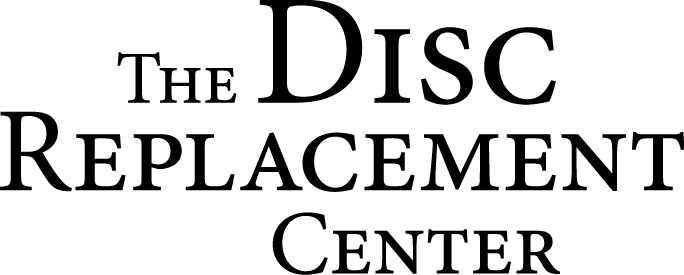About Disc Replacement
Similar to hip and knee joint replacements, significant advancements have been made in disc replacement surgery for treating neck and spine conditions. Unlike traditional spinal fusion, which involves removing painful discs and fusing two or more vertebrae together — which result in limited mobility — disc replacement surgery replaces the painful disc with an artificial disc to enable the neck/spine to function as intended. Artificial discs are structurally similar to natural discs, which serve as shock absorbers in the neck and back.

How is Disc Replacement Performed?
An artificial disc replacement is performed using an anterior approach, which means that a surgeon performs the procedure through the front of the neck or abdomen. With an anterior approach, the organs and blood vessels must first be moved aside to enable the surgeon access to the spine without affecting nearby nerves. The surgeon removes the worn or degenerated disc and replaces it with an artificial disc. In general, most disc replacement surgeries are completed within one to two hours, but this can vary by patient.
Benefits of Disc Replacement Surgery
When compared to conventional spinal fusion surgery, artificial disc replacement surgery in the neck or back provides many benefits:
- Preserves range of motion for a more natural feeling in the neck or back
- Prevents degeneration of discs above and/or below the affected disc(s)
- Does not require bone grafting, which can cause pain
- Requires a less invasive surgery, resulting in lower surgical risks, less pain and less blood loss
- Offers a faster recovery, so patients can return to activities sooner
- Reduced risk of revision surgical procedure
What to Expect Before Disc Replacement Surgery
If you are contacting us from outside of Utah, our concierge team will provide clear instructions for transfer of all your medical records and radiographic studies. You may be required to undergo a medical examination and pre-surgical tests to determine the nature of your neck or back pain, and to determine if you are an appropriate candidate for disc replacement surgery. Tests may include blood and urine tests, heart checks, X-rays and diagnostic images of the affected area. Diagnostic testing may include magnetic resonance imaging (MRI) and computerized tomography (CT). We will also review any medications that you are currently taking, and will outline what medications you should continue to take until the procedure. You will also be instructed to not eat or drink anything for a certain number of hours leading up to the procedure.
What to Expect After Disc Replacement Surgery
After surgery, Dr. Khachatryan will meet with your family in the family waiting room to review the details of the surgical success.
Following disc replacement surgery, you will remain at the hospital for an average of one to two days for continued close monitoring (hospital stays may vary by patient). You may be encouraged by our team of physical therapists to stand and walk within a day following surgery. Full recovery from disc replacement surgery takes approximately six weeks, which is less than half of the time it takes to recover from fusion surgery. The physical therapy team may recommend additional movements and exercises to maintain flexibility and mobility in your spine and/or neck. The more you adhere to these recommendations, the faster your recovery process.
Dr. Khachatryan and his physical therapy team will also provide you with guidelines as to what types of movements to avoid, such as jarring motions. Please note, disc replacement surgery is designed to lessen pain symptoms, but may not eliminate pain completely.
Disc Replacement, An Effective Solution for Many Conditions
If you suffer from one or more of the following neck or back conditions, you may be a candidate for artificial disc replacement surgery to relieve your pain symptoms:
- Herniated/bulging disc
- Spinal stenosis
- Foraminal stenosis
- Chronic neck pain
- Arthritis of the spine
- Degenerative disc disease
- Some cases of cervical spondylotic myelopathy (spinal cord compression)
Risk of Disc Replacement Surgery
As is the case with all types of surgeries, disc replacement surgery involves risks. Complications from surgery may include anesthesia problems, blood clotting, infection, nerve injury, device migration, etc. If you are deemed to be an appropriate patient for disc replacement surgery, full discussion regarding various risks and benefits of this procedure will be provided.
What to Expect During Disc Replacement Surgery
Please leave any valuable personal items at home. If you are traveling for your surgery, our concierge team will assist you with all your travel needs. You will arrive and be admitted into the hospital, where you will change into a hospital gown. You will be brought to the surgical suite and will be placed under general anesthesia.
At the time of surgery, Dr. Khachatryan will make an incision in the neck or abdomen, and will carefully move organs and blood vessels aside to allow access to the spine. He will surgically remove the damaged/worn disc and position the artificial replacement in place. Any moved organs and blood vessels will be repositioned, the incision will be closed, and you will be relocated to a recovery suite where you will be closely monitored by an experienced team of health care professionals.
Choosing a Disc Replacement Surgeon
Choosing a qualified surgeon is just as important as the decision to have surgery. When choosing a surgeon for a procedure as important as disc replacement, you want to make sure that you are in good surgical hands. Dr. Armen Khachatryan is one of the most experienced disc replacement surgeons in the U.S. and has been performing disc replacement surgical procedures since 2006, around the same time the first artificial disc received FDA approval in the U.S. In fact, Dr. Khachatryan has also served as a clinical investigator for cervical disc replacement procedures.


